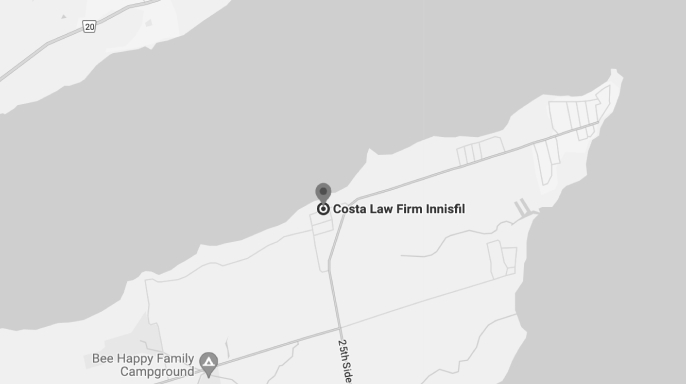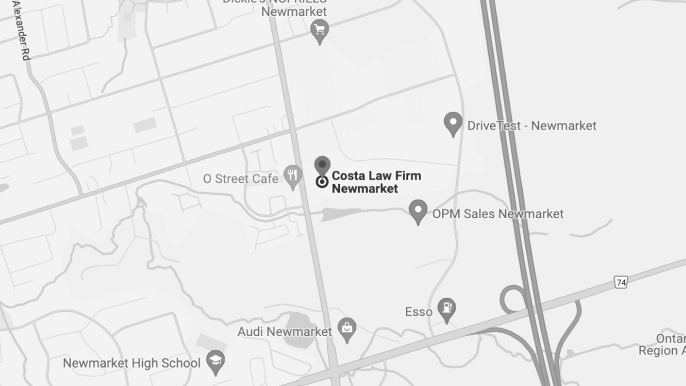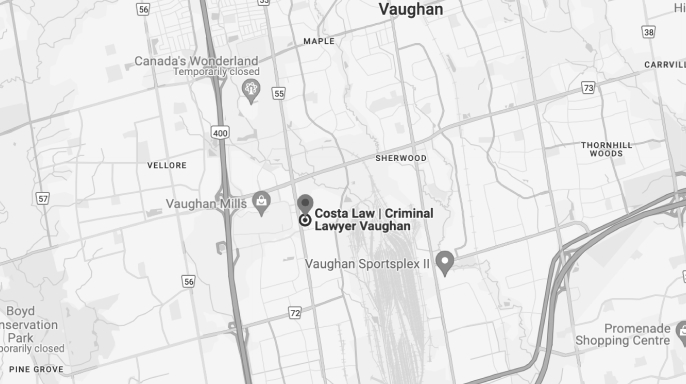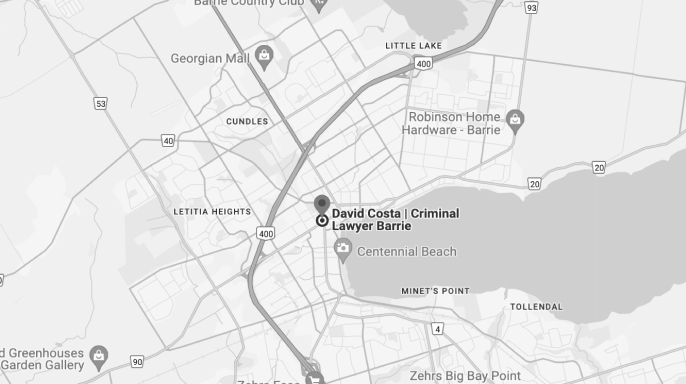Voyeurism Lawyer Toronto
If you are currently under investigation or charged with voyeurism, you need skilled voyeurism lawyers by your side. Contact Costa Law Firm – we are a full-service law firm that has gained an unmatched reputation for our creative and result-driven approach to criminal law. Our lawyers have the necessary skill, determination, and knowledge to fight for your right to a fair and just trial.

Understanding Voyeurism Charges
Individuals who get sexual gratification by observing other people in the nude or participating in sexual activity are referred to as voyeurs. Their actions are not unlawful if the individual(s) who were observed or recorded consented to the viewing. However, when voyeurism happens secretly without the consent and knowledge of those being observed, it is a criminal offence with a maximum imprisonment of five years.
According to Section 162(1) of Canada’s Criminal Code, you commit a voyeurism offence when you observe, whether by electrical or mechanical means or make a visual recording of another individual in circumstances that raise a reasonable expectation of privacy. This is particularly true if the person being observed is reasonably expected to expose his or her genital organs or anal region, be nude, or engage in explicit sexual activity.
In addition, you may be charged if you observe or record an individual engaged in nudeness or explicit sexual activity for the purpose of recording or observing an individual in such a state. It is a criminal offence to make such observations or recordings for sexual purposes.
Therefore, it is considered voyeurism when you secretly watch or visually record another individual where they reasonably expect privacy.
Voyeurism and the Current Law
As with most laws listed in the Criminal Code, the voyeurism law has inherent limitations linked to the nature of its language. For instance, courts initially narrowly interpreted ‘reasonable expectation of privacy.’ The interpretation focused on a ‘location-specific’ basis to cover bathrooms, bedrooms, changing rooms, and shower areas.
However, in 2019, the Supreme Court of Canada considerably widened the interpretation of ‘reasonable expectation of privacy’ in its precedent-setting ruling in R. v. Jarvis, 2019 SCC 10. The new interpretation adds the concept of freedom from unconsented or unwanted attention, scrutiny, or intrusion.
The Supreme Court’s decision has created a more subjective and open-ended definition of ‘sexual purpose.’ This is a critical factor needed to obtain a voyeurism conviction. To establish whether the alleged voyeurism was driven by sexual purpose, there must be a ‘reasonable’ and objective assessment of the alleged recording or observation.
Without clear evidence to support any arguments related to sexual purpose, it all comes down to subjective opinion despite the courts’ call for objectivity in such assessments. At Costa Law Firm, we have many years of experience in Canadian law. Indeed, we have experience in defending voyeurism cases. Whether you want to negotiate an outcome or proceed to trial, we have a team of experienced and reliable lawyers to defend your voyeurism charges.

Conceptualizing Criminal Voyeurism
In light of the Supreme Court’s R. v. Jarvis decision, a voyeurism offence should be considered from different perspectives. These include:
Privacy Breach
When people are in specific locations like changing rooms, bathrooms, bedrooms, and similar locations, they expect privacy. Thus, these locations retain a location-centric consideration of reasonable expectation of privacy.
According to the law, secretly recording or observing people in such areas constitutes an offence (voyeurism) as long as the conditions outlined in S.162(1) are at play. These conditions include explicit sexual activity, nudity, exposure of breasts, genital organs, or anal region.
At Costa Law Firm, we will analyze your case details to determine whether the factors or circumstances that support a ‘reasonable expectation of privacy’ existed during the alleged observation or visual recording (voyeurism). These factors include:
- The exact location of the individual at the time of the alleged observation or recording.
- The nature of the alleged misconduct – was the observation or recording deemed intrusive?
- Did the victim consent, or were they aware of the observation or recording?
- The content that was recorded or observed.
- How the observation or recording was conducted.
- Existence of any rules, policies, or regulations that may have guided the alleged observation or recording.
- The purpose for which the recording or observation was done.
- Relationship between the accused and the victim.
- Personal attributes of the individual who was observed or recorded.
At Costa Law Firm, we will assess all elements of your case that could help implement an effective defence strategy. If you are accused of voyeurism, schedule a free consultation today and discuss your case with experienced criminal defence lawyers.
Sexual Offence
The court’s ruling on the Jarvis case clarified and widened the definition of a ‘reasonable expectation of privacy’ under voyeurism offences. However, the justices did not address the aspect of the sexual purpose of the alleged privacy violation. This is because the Ontario Court determined previously that the observation or recording was for sexual purpose.
Common Ground – Privacy Violation and Sexual Offence
As noted in most court decisions involving voyeurism charges, an ordinary understanding of privacy must consider the fact that an individual may be in circumstances where they expect to be observed or recorded for some reason but not for a sexual purpose.
For instance, if you are sunbathing at a beach or lying in a public park, you can expect to be observed by nearby people or appear in someone’s photograph incidentally. However, voyeurism would be committed by someone who would use a telephoto lens to take up-skirt images of women.
Proving Voyeurism in Court
To secure a conviction for voyeurism, the Crown prosecutor must prove three elements of this offence beyond a reasonable doubt. First, the prosecutor will need to prove that the victim of voyeurism had a reasonable expectation of privacy.
Another element that must be proven beyond a reasonable doubt is that the observation or recording was unconsented and covert. Lastly, the prosecutor will need to prove that you (the alleged offender) were motivated by sexual reasons.
We Will Defend Against Your Voyeurism Charges
During the trial, our competent lawyers will assess all possible defence strategies and implement the most suitable one. We will work tirelessly to raise a reasonable doubt about the prosecutor’s evidence and narrative on the elements of a voyeurism case. Here are some of the defences we could use.
No Reasonable Privacy Expectation
A critical requirement in a case involving voyeurism is that the prosecution must prove that the victim (the individual recorded or observed) by the alleged offender had a reasonable privacy expectation.
Our lawyers can defend you by proving that the individual you recorded or observed was in a location or area that does not give rise to a reasonable privacy expectation. For instance, a clothing-optional beach is not an area that could give rise to a reasonable presumption of privacy. We can use such a defence strategy to get your case withdrawn if it is based on the wrong expectations of privacy.
The Visual Recording Was not for a Sexual Purpose
S.162(1)(c) of the Criminal Code covers voyeuristic recordings – when a person is recorded or observed for sex-related purposes. Our knowledgeable lawyer could successfully argue that the alleged observation or video recording was never made for any sexual purpose. Perhaps it was accidentally captured during surveillance.
Breach of Section 8 Charter Rights
Our reliable criminal defence lawyers will analyze the circumstances of the fact-gathering process and police conduct during and after arrest (if any). Suppose the law enforcement illegally acquired evidence from the accused’s phone, other electronic devices or at their home. In that case, our skilled lawyers could argue that S.8 Charter rights were violated through unreasonable search or seizure.
Penalties for Voyeurism
According to the Criminal Code of Canada, voyeurism is an indictable offence punishable by up to five years imprisonment. If the Crown prosecution decides to proceed by summary conviction, the offender may face a lesser jail term, fine, or both.
The prosecution may proceed by indictment if the voyeurism charges against you are severe. Suppose the alleged voyeurism happened in the context of sexual offences like child pornography, sexual exploitation, or sexual assault. In that case, the prosecution would most likely proceed with indictment.
However, if the circumstances surrounding the voyeurism allegation are less severe, the prosecution may decide to proceed by summary conviction. It is crucial to mention that whether the prosecution proceeds by indictable offence or summary offence, a conviction will negatively impact the accused’s criminal record.
At Costa Law Firm, we understand that a criminal record is permanent and will affect your personal and professional life significantly. For instance, a voyeurism conviction may make it challenging for you to find employment opportunities or travel to other countries. That is why we will leave no stone unturned to ensure you get a fair trial.
Remember, a convicted voyeur may apply for pardon so prospective employers cannot see their criminal record. However, all government agencies and law enforcement departments will have access to your record. Therefore, it is better to work with our criminal defence lawyers to fight the voyeurism allegations against you, particularly if you are wrongfully accused.
Being Placed on a Sex Offender Registry
Suppose the prosecution proves beyond any reasonable doubt that you committed (or intended to commit) other sexual offences (outlined in the Criminal Code) while committing voyeurism. In that case, you may be placed on the sex offender registry for 10 years.
Undoubtedly, voyeurism occurs when one observes, by mechanical or electronic means, or records another individual who is in a location that gives rise to a reasonable expectation of privacy. Therefore, it is a serious criminal offence to observe or record such a person when he or she exposes his or her genital organs, the anal region or when engaged in explicit sexual activity. Some sexual crimes could aggravate a voyeurism charge.
Suppose you intended to perform other sexual activities that could violate the sexual integrity of the other person. In that case, you may be found guilty of crimes that could lead to placement in the sex offender registry. That is why you should seek legal support and representation from our experienced criminal defence lawyer to fight the criminal charges against you.
Implications
Individuals convicted of sexual assault, child pornography, and voyeurism offences may required to register as sex offenders. Suppose you were found guilty of secretly recording an individual engaged in explicit sexual activity or printing and distributing voyeuristic images. Such an activity constitutes criminal offences that could get you listed in the sex offenders’ registry. Here is how appearing in this registry could affect you.
Personal Information
Once you are placed on the registry, you will be responsible for reporting to the police each year. While this list may not be accessible to the public, every accredited police agency in the country can access it. The registry will outline your personal data, including name, vehicle registration, address, birth date, employment, and other forms of personal information.
Work Restrictions
A conviction of sexual-related crime involving persons under 14 years often results in strict conditions on where the convicted offender can visit or live. These restrictions extend to where the offender can be employed or volunteer to work.
The court may prohibit the offender from working in areas where they would have close contact with persons considered children. This is particularly relevant if the official duties involved the offender being in a position of authority or trust towards children. Remember, this restriction applies to continuing any past employment or seeking new employment opportunities around children.
Talk to Our Voyeurism Lawyer
At Costa Law Firm, we have the knowledge, skill, and experience necessary to provide legal advice and fight the voyeurism allegations filed against you. We understand that the outcome of your case will largely depend on your situation’s specific circumstances and facts. Our lawyers will perform a thorough assessment of your case, gather facts, and ensure you understand your options.
Remember, these criminal charges are difficult to defend unless you have a skilled lawyer on your side. If convicted, you face a maximum penalty of five years imprisonment. Beyond imprisonment, you may be placed on the sex offenders’ registry.
Considering the gravity of being convicted of voyeurism in Canada, facing such charges without a lawyer is never a good idea. Thus, if you or a loved one is being investigated for voyeurism, schedule a consultation today and speak to a competent lawyer. This will give you peace of mind, knowing that we will protect your rights.
Request A Consultation
Testimonials
What our clients are saying
Contact Us
Costa Law Firm
Costa Law Firm is a law firm located in Toronto with exceptional credentials that stands out for its commitment to client service. Our service minded approach has led Costa Law Firm to be one of the most reliable law firms in Toronto.
Address
Main Office:
1015 Bloor Street West, Toronto, Ontario M6H 1M1
Phone: (416) 535-6329
Fax: 416-535-4735
info@costalawfirm.ca
We provide emergency services for urgent matters.
Consultation Office:
17075 Leslie St Unit 6, Newmarket, ON L3Y 8E1Vaughan location 290 Caldari Rd Unit 8, Concord, ON L4K 4J4, CanadaBarrie location 49 High St 3rd floor, Barrie, ON L4N 5J4, Canada











